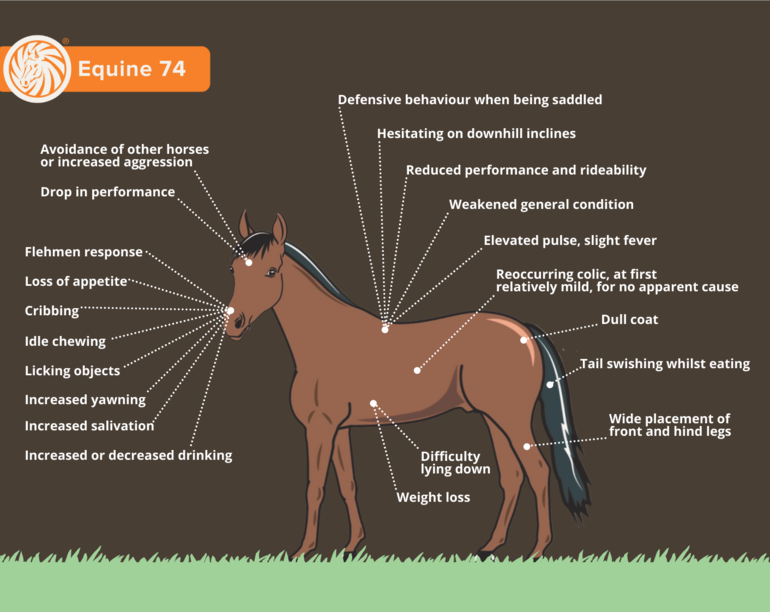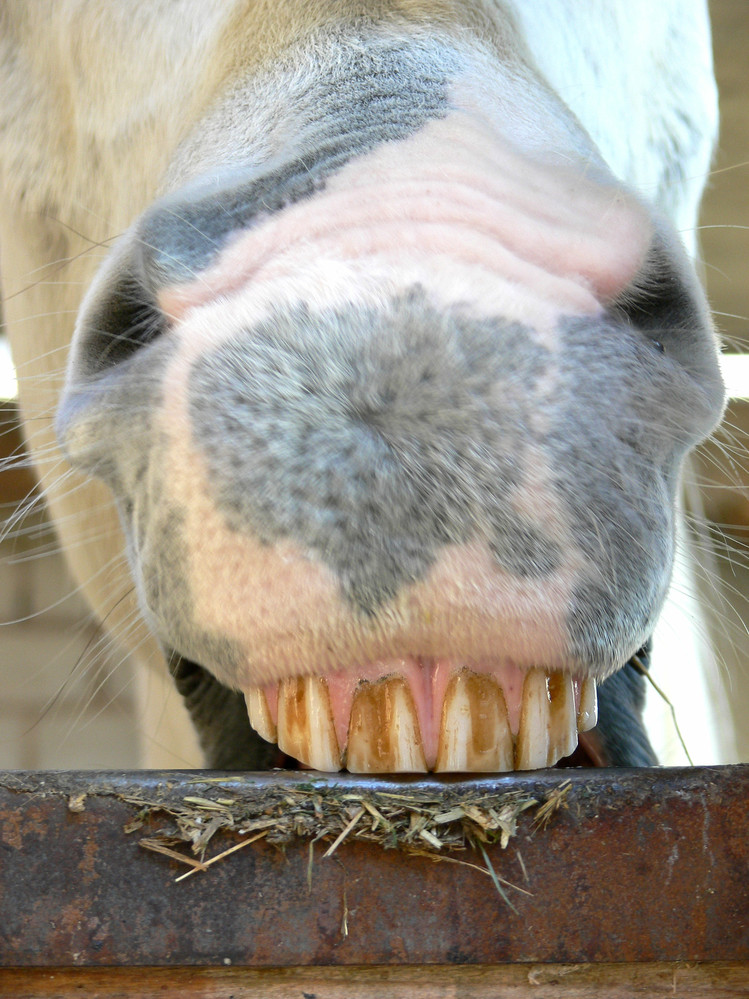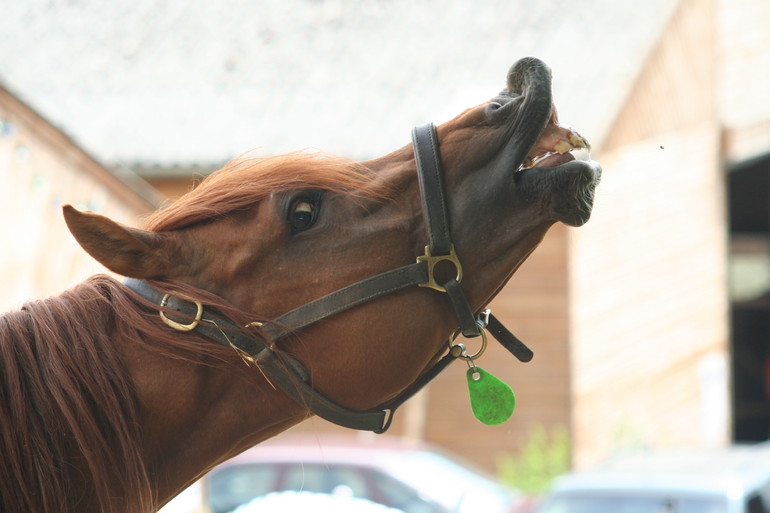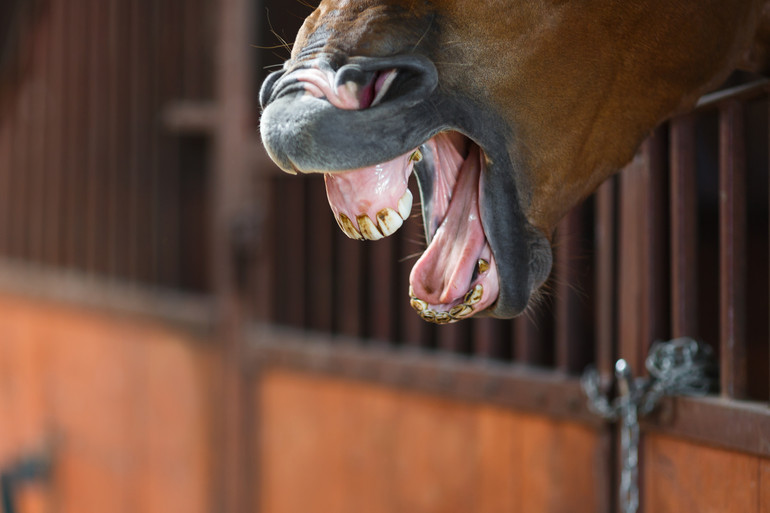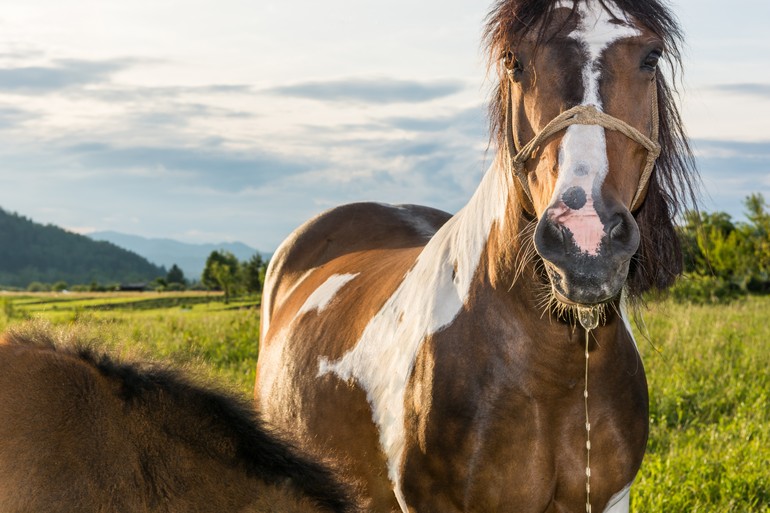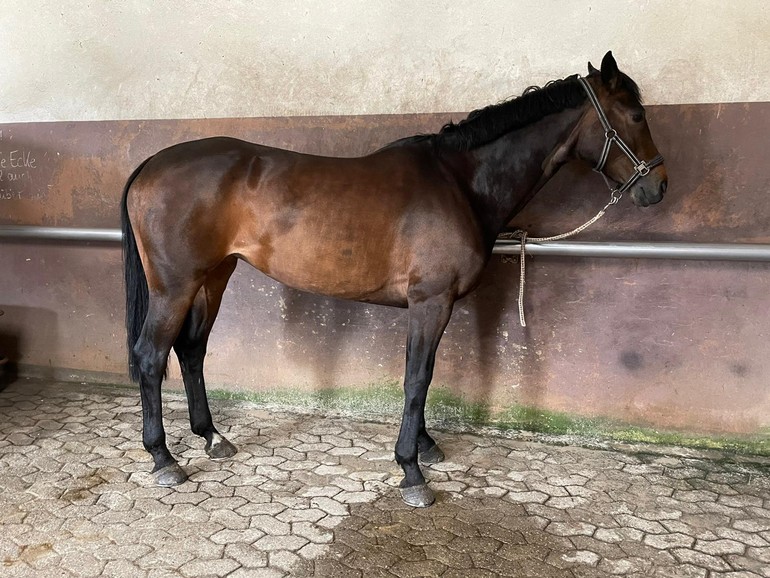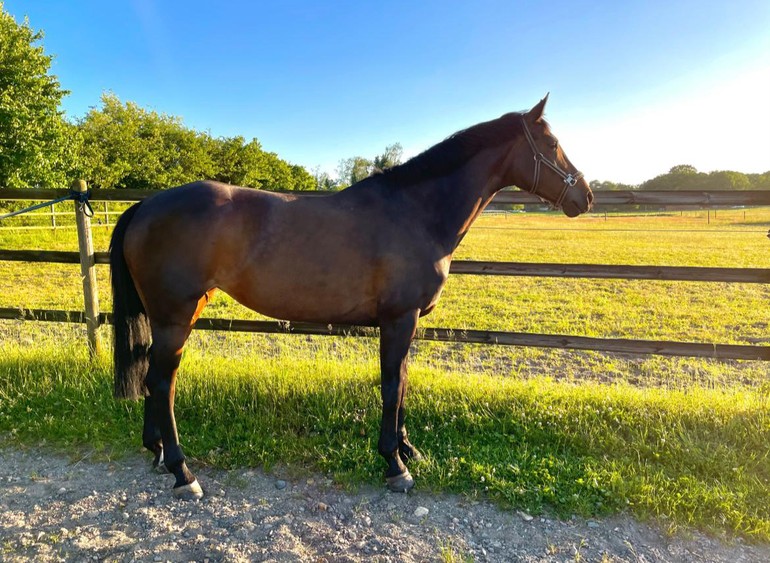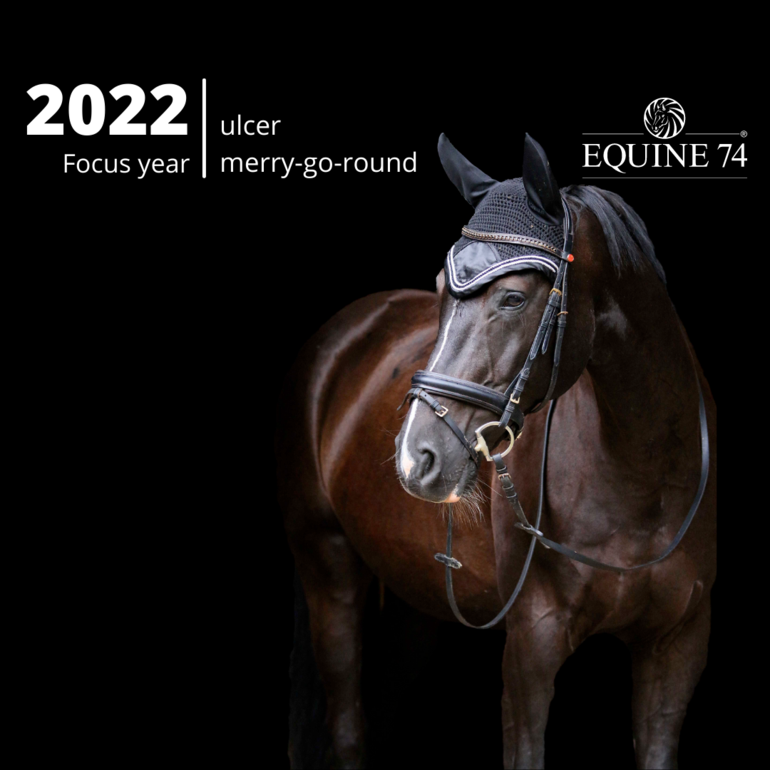Which symptoms a stomach patient expresses and how he deals with his pain varies greatly from patient to patient. For example, some suffer more pain, suffer quietly with severe stomach ulcers and eat apparently only a little worse, while the other one clearly shows that he is not well even with a slight irritation of the stomach mucosa, for example, by frequently flehming, colic again and again or extremely tense and unridden.
Therefore it is important to always keep an eye on the expression behaviour of your horse and to seek advice from outsiders in case of uncertainty, because often creeping changes of behaviour do not attract attention at all or only late.
For your convenience we have allocated symptoms into categories. Simply click on the symptom you want to learn more about.
Feeding and watering behaviours
- Loss of appetite
- Idle chewing
- Tail swishing whilst eating
- Increased or decreased drinking
In the barn and out at pasture
- Difficulty lying down
- Wide placement of front and hind legs
- Defensive behaviour when being saddled
- Avoidance of other horses or increased aggression
Here you can find information about the first 8 symptoms.
Other unusual behaviour
General state of health
- Weakened general condition
- Elevated pulse, slight fever
- Reoccurring colic, at first relatively mild, for no apparent cause
- Increased salivation
Decline in performance
Appearance
Equine 74 Gastric counteracts the effects of constant stress-related acid problems with high mineral acid buffering. Learn more.
Often it is unclear which is first - the gastric ulcer or the cribbing behaviour, because both can be either cause or symptom.
However, it is often observed that horses with a tendency to cribbing will do so more often as a result of a gastric ulcer.
In this way the horse tries to stimulate salivary flow in order to alleviate stomach pain.
There are also horses which begin cribbing only when they develop stomach ulcers.
Cribbing normally involves the horse placing its incisors on an object and swallowing air.
The contraction of the lower neck muscles opens the pharynx and results in the typical cribbing sound.
Rarely, horses will exhibit cribbing when they are free.
These don't place their incisors on an object but hold their heads freely.
Flehmen behaviour is when the horse extends its head forward and curls its upper lip.
In most cases, horses show this behaviour when they notice a smell and want to identify it more closely.
But horses also exhibit flehmen behaviour as a sign of pain and discomfort, as demonstrated by many horses that have ulcers or colic.
Whether in the stable, at pasture, during grooming or whilst being ridden – if a horse is constantly yawning, this is a relatively clear indication for diseases of the gastrointestinal tract.
At the same time, yawning also helps to reduce stress.
And if there’s anything that an ulcer patient has plenty of, it’s stress – as a cause of the stomach ulcer and/or resulting from the pain.
Some horses also continue yawning from time to time even after their gastric ulcers undergo successful treatment.
Naturally stress in this context is a cause, not a symptom, but with stomach ulcers it can hang over our horses’ heads like a Sword of Damocles.
We therefore recommend that you read the corresponding article about equine stress and how to keep this to a minimum.
After all, observation of your animal is an important aspect in recognising stomach ulcers – and false alarms should be avoided, as veterinary examinations are rarely remembered as cherished holiday experiences. And that puts stress on us.
Most horse owners think that their horses lick objects because they have a mineral deficiency.
But this is also observed in horses with stomach ulcers.
The extent varies greatly from horse to horse, as do the objects, which are often metallic but can also include wood or concrete walls.
General state of health
13. Weakened general condition
Horses with a weakened general condition may seem introverted, or even depressed.
They take little part in their surroundings, show little interest in their stable mates and in many cases in their caregivers, and often stand with their heads in a corner.
14. Elevated pulse, slight fever
In acute cases, the horse may have an elevated pulse and a slight fever.
These symptoms are often accompanied by mild colic from the severe stomach pain.
In horses, a normal pulse is between 28 and 44 beats per minute and a normal temperature is between 37.5 and 38.2 degrees celsius.
If these are higher, a veterinarian should be consulted immediately to administer treatment.
Equine 74 Gastric Make your horse feel happy inside! Natural Acidbuffer, optimized pH-level in horses stomach and gut that helps for better performance and satisfaction without compromise. Because good for your horse should also mean good for you! Order a free feed sample.
15. Reoccurring colic, at first relatively mild, for no apparent cause
Mild colic episodes may occur after a horse eats concentrate feed and do not last long.
The horse tucks up his belly, possibly kicks in the direction of his belly and/or occasionally lies down and rolls on the ground.
These episodes usually disappear on their own after a short time.
Eating concentrate feed causes more bicarbonate-containing saliva to be formed per kilo than eating hay.
For example, gastric acid formed by eating concentrate feed is less sufficiently buffered than when the horse eats hay.
Saliva production increases as the horse’s organism tries to counteract the low pH value in the stomach.
The saliva has a basic pH value and buffers the gastric acid.
Horses may be observed to salivate even when they are neither eating nor chewing on something nor have a bit in their mouth.
Increased salivation will often occur after the horse eats concentrate feed.
Decline in performance
Stomach pain and reduced nutrient intake can lead to a drop in performance levels.
The horse does not have enough energy to be on top of its game.
The horse is dull and lethargic.
It doesn't like to trot and is unmotivated.
This symptom is exacerbated by acute pain.
Just like us humans, horses are not able to perform at their full potential when they suffer from pain and lack of energy.
Equine74 Gastric counteracts the effects of constant stress-related acid problems with high mineral acid buffering. Learn more.
18. Reduced performance and rideability
Many riders initially think that their horses are simply unwilling and don’t want to work.
The most common cause of unrideability is often bridle or back problems.
Stomach problems, however, shouldn’t be overlooked.
They can cause a horse to experience severe pain, especially when working under the saddle, and the horse will adopt a compensating posture when walking in an attempt to alleviate this pain, keeping its back rigid, moving with tightness, bucking, becoming listless and no longer willing to work.
19. Hesitating on downhill inclines
Going downhill can cause gastric acid to enter the sensitive area of the stomach.
If this area is affected by stomach ulcers, it can be very unpleasant for the horse, who will be reluctant and must be commanded to go downhill, or will even refuse to do so.
A loss of appetite is generally accompanied by weight loss.
The reduced intake of food means that the organism is no longer supplied with enough energy and nutrients, leading to reduced body mass.
Weight loss might first be noticed when the ribs suddenly are clearly visible. The same is true for the point of the hip as muscle tone is naturally lost.
A horse does not become emaciated overnight.
It would certainly be wrong to say that the other symptoms would be better to have, but when a horse gets to this point, it means that certain problems – including a stomach ulcer – have long been overlooked.
But it should never come to this!
Not every horse suffering from gastric ulcers has a dull coat.
Some horses have shiny coats and appear healthy, despite having gastric ulcers.
In many cases gastric ulcers or their symptoms, such as loss of appetite or weight loss, will disturb the intestinal flora, so that the intestine can no longer absorb sufficient nutrients.
As a result, the metabolism no longer has enough nutrients available and the coat loses its shine, becoming dull and lacklustre.
If you are interested in more symptoms of gastric ulcer, click here.



